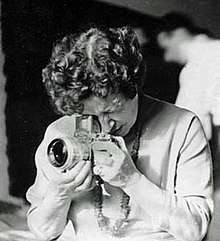Zofia Rydet
Zofia Rydet (May 5, 1911 – August 24, 1997)[1] was a Polish photographer, best known for her project "Sociological Record",[2] which aimed to document every household in Poland. She began working on "Sociological Record" in 1978 at the age of 67, and took nearly 20,000 pictures until her death in 1997.[3] Many of the pictures remain undeveloped. The photographs are predominantly portraits of children, men, women, couples, families and the elderly amidst their belongings. Rydet tended to photograph her subjects straight-on, using a wide-angle lens and a flash.
Zofia Rydet | |
|---|---|
 Rydet in the 1950s. | |
| Born | May 5, 1911 Stanisławów, Poland |
| Died | August 24, 1997 (aged 86) Gliwice, Poland |
| Nationality | Polish |
| Known for | Photography |
| Website | www |
Personal life
Rydet was born in Stanisławów. She attended the Główna Szkoła Gospodarcza Żeńska in Snopków. As a young woman she had a number of occupations such as working for the Orbis Polish Travel Office and running a stationery shop.[1]
In mid-life she returned to her hobby of photography. She joined the Gliwice Photographic Society in 1954 and improved her skills.[1][2]
Work
In 1961 Rydet had a major exhibition of photographs called Mały człowiek (Little Man). Rydet's intention for Little Man, was to show that children had good and bad experiences in their life, just like adults. She also wanted to depict how societal issues and policies can affect children. Rydet did not want to show children as a carefree stereotype, but rather as human.[4]
In 1965 the works in this exhibition were collected into a book edited by Wojciech Zamecznik.[2] The same year she became a member of the Union of Polish Art Photographers.[1]
In Czas prezemianija (The Passage of Time, 1963-1977), Rydet portrays the dignity and grace of old age in a series of intimate portraits.[5] In 1976, Rydet was awarded the Excellence de la Fédération Internationale de l´Art Photographique (EFIAP).[1]
In 1978 Rydet began her work on "Zapis Socjologiczny" ("Sociological Record").[2] The project consists of thousands of informal black and white photographs taken in ordinary households throughout Poland.[2][3]
Rydet died in Gliwice on August 24, 1997.[1]
References
- "Zofia Rydet". zofiarydet.com. Retrieved 1 March 2018.
- Le Nart, Agnieszka. "Zofia Rydet". culture.pl. Adam Mickiewicz Institute. Retrieved 1 March 2018.
- "Zofia Rydet: the woman who tried to photograph every house in Poland – in pictures". The Guardian. 2015-12-08. Retrieved 1 March 2018.
- "Zofia Rydet". Culture.pl. Retrieved 2020-03-01.
- Medea muckt auf : Radikale Künstlerinnen hinter dem Eisernen Vorhang = The Medea insurrection : radical women artists behind the Iron Curtain. Altmann, Susanne,, Lozo, Katarina,, Wagner, Hilke, 1972-, Staatliche Kunstsammlungen Dresden,, Wende Museum (Culver City, Calif.). Köln. 2019-05-03. ISBN 978-3-96098-527-3. OCLC 1099843511.CS1 maint: others (link)